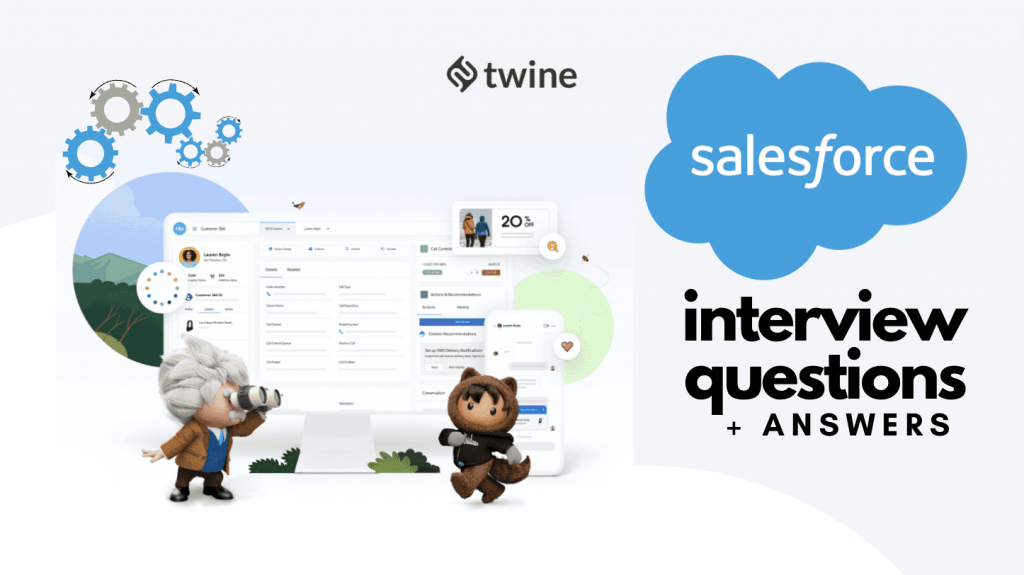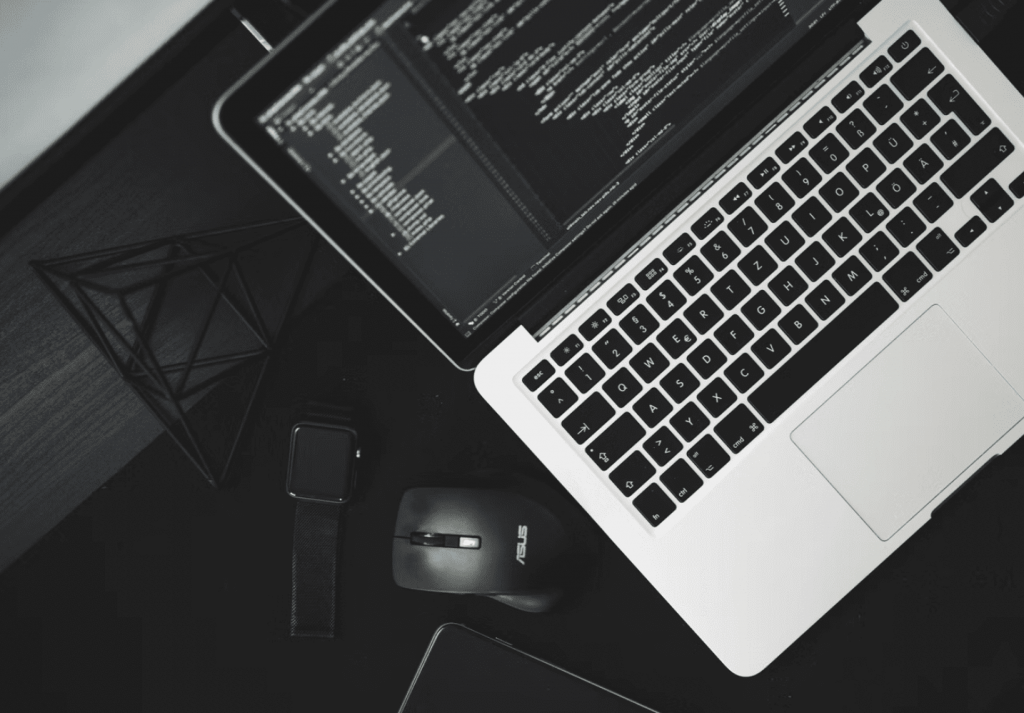
For more Web Tools, check out the Freelancer Toolkit…
Do you know the most common salesforce developer interview questions?
Salesforce is a provider of an integrated suite of business application products. These products are designed to help companies build lasting relationships with customers and other prospects. The company’s flagship product, Salesforce CRM, includes core features such as online surveys, email marketing, document sharing, and more.
If you’re thinking of becoming a Salesforce developer, you first have to pass the interview process. That means preparing well before your interview day.
Do you have the answers to these common salesforce developer interview questions?
Want to join Twine’s archive of highly skilled freelance developers? Find out more here…
General Salesforce Developer Interview Questions

Since you’re interviewing for a Salesforce developer position, you’ll be answering various questions about the platform.
Salesforce consultants, developers, and architects will ask questions regarding how familiar you are with different aspects of the platform. Some of the most general questions you may encounter during your interview include the following:
1. What do you know about Salesforce?
Of course, when you want to become a Salesforce developer, it’s important to show that you understand how Salesforce works.
To answer this question, you should explain that Salesforce is a SaaS or Software as a Service solution. This means that it’s software that resides on a server somewhere in the cloud. Salesforce is a CRM platform, which means that it helps businesses manage their contacts, deals, opportunities, leads, accounts, and more.
When discussing Salesforce, it’s also helpful to mention the benefits of using the platform.
For example, if the interviewer asks what problems the platform solves, you can explain that it allows users to view deal activity from anywhere at any time. Ultimately, this helps them stay organized, so they can focus on selling more effectively. Another benefit is that it makes data easier to access since everything is stored electronically – no physical file boxes are needed.
2. How would you describe yourself as a Salesforce developer?
This can either be one of the easiest or most difficult salesforce developer interview questions to answer. You want to use language that shows off your experience with Salesforce.
Describe how you work best – do you prefer working alone or collaboratively? What areas of the platform do you find challenging?
When describing yourself as a Salesforce programmer, remember to emphasize skills rather than titles. This will help you go into greater depth about your strengths and interests.
3. Tell me about a project you worked on with Salesforce.
Here, the interviewer wants to see how comfortable you are telling stories about your work experiences. In order to demonstrate that, give a specific example of something you did that was related to Salesforce.
The key? Think about a situation where you had to solve a problem and figure out how to implement a solution. Don’t just tell a story about a generic task, such as coding.
Be sure to talk about the features you created and the challenges you faced while solving these issues. If you’re having trouble coming up with examples, you can always talk about what you learned while building a previous project.
4. What do you know about CRM?
As previously mentioned, Salesforce is a CRM platform, so you can expect to receive some CRM-related questions. This includes knowing what CRM stands for (customer relationship management), why companies use them, and what types of CRM products exist.
In addition, be prepared to explain how Salesforce is different from other solutions. The interviewer may ask about the pros and cons of using Salesforce vs. another CRM product. You might even get asked to provide a few tips on using Salesforce.
5. Explain the different Salesforce editions.
Salesforce offers five different editions: Essential, Enterprise, Professional, Developer, and Unlimited. Each edition focuses on different business requirements based on the size of the company. If the interviewer asks about the differences between the salesforce editions, you can use this quick guide to compare the options.
- Essential: Ideal for small businesses that need basic contact management and email functionality.
- Enterprise: Ideal for businesses that require additional enterprise-level functionality.
- Professional: Designed specifically for midmarket companies looking for advanced functionality.
- Developer: Provides developers with access to all API services, components, and objects.
- Unlimited: Offers unlimited contacts, opportunities, accounts, and cases.
6. Which part of Salesforce do you enjoy most?
You’ll probably get asked which area within Salesforce you enjoy the most. Remember, this doesn’t have to be solely focused on programming. There are so many aspects of being a Salesforce developer that can appeal to interviewers.
For instance, you may want to discuss how you love the creative process behind creating custom reports and dashboards, or perhaps focus on helping users navigate through the system.
Again, this question is about demonstrating that you are interested in more than just code. So whatever you choose, make sure it’s something that shows off your unique skill set as well as demonstrates that you are passionate about making your organization successful. Being a Salesforce developer requires a lot of passion and perseverance over time.
General Interview Questions

Moving forward, an interview for a Salesforce developer job is more than just testing your knowledge about the platform. Interviewers will ask you more than the standard salesforce developer interview questions. They’ll also want to know if you possess certain soft skills needed for the role.
They want to know how you can handle real-life situations, how you manage your workspace and calendar, and much more. Most importantly, they want to see whether you’ll be a good fit for their team and culture. Here are some common ones to prepare for:
7. Tell me about yourself.
At the start of an interview, you will likely be greeted with a series of questions regarding your background and experience. These questions will help the employer determine the type of candidate they’re interviewing.
When answering this question, don’t give extremely detailed answers that are already found on your resume. Instead, try to summarize the highlights from your resume and explain how you got from Point A to Point B. Afterward, explain your goals for the position.
8. What are your greatest strengths and weaknesses?
This is another common question that an interviewer will likely ask you at the start of an interview. Make sure that you are able to answer the following questions honestly. A good tip when answering this kind of question is to have examples in mind.
For example, if you’re weak at time management, talk about what you’ve done recently to improve your time management skills. Asking a question like this helps you demonstrate humility while showing that you acknowledge the areas where you have room for improvement.
9. How did you learn to program?
An interviewer might want to know how you learned how to develop software applications. If you didn’t receive formal training, chances are you picked up coding by tinkering around.
In that case, it could be beneficial for you to show that you understand the basics of computer science theories such as data structures and algorithms. If you did take classes, then it would be great to mention them here. Explain why these courses were important to your personal growth and development as well.
10. What are your hobbies/interests outside of programming?
Lastly, there may be times in which an interviewer wants to know how you spend your free time. You want to focus on explaining why you enjoy doing what you love and how you take care of your mental health outside of work.
Remember that these questions mostly serve as ice breakers – so don’t get too nervous! Just keep your answers short and sweet.
The Bottom Line
Now that you know what to expect, you can begin preparing for your next interview as a Salesforce Developer. You can use these tips as a starting point and tailor them to your own situation.
Keep in mind that the best way to ace an interview is to practice mock interviews. Do a few practice sessions before getting into the real thing, and you’ll be ready to confidently answer any salesforce developer interview questions thrown your way.
Ready to get hired? At Twine, we have dozens of top-quality jobs being posted each and every day. From design to marketing, development to copywriting – there’s a job ready for your skills. Join the marketplace of diverse creative talent here.








